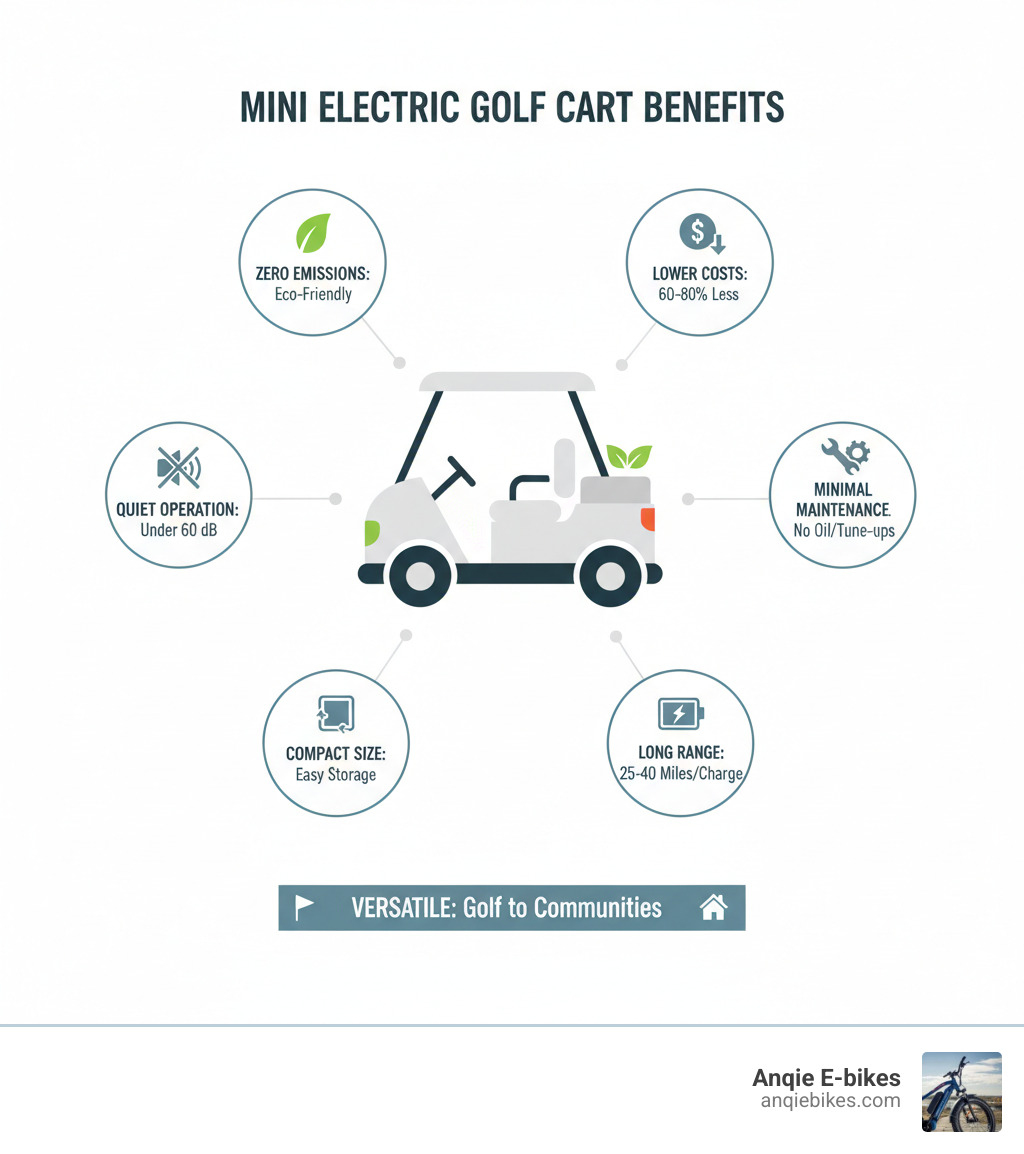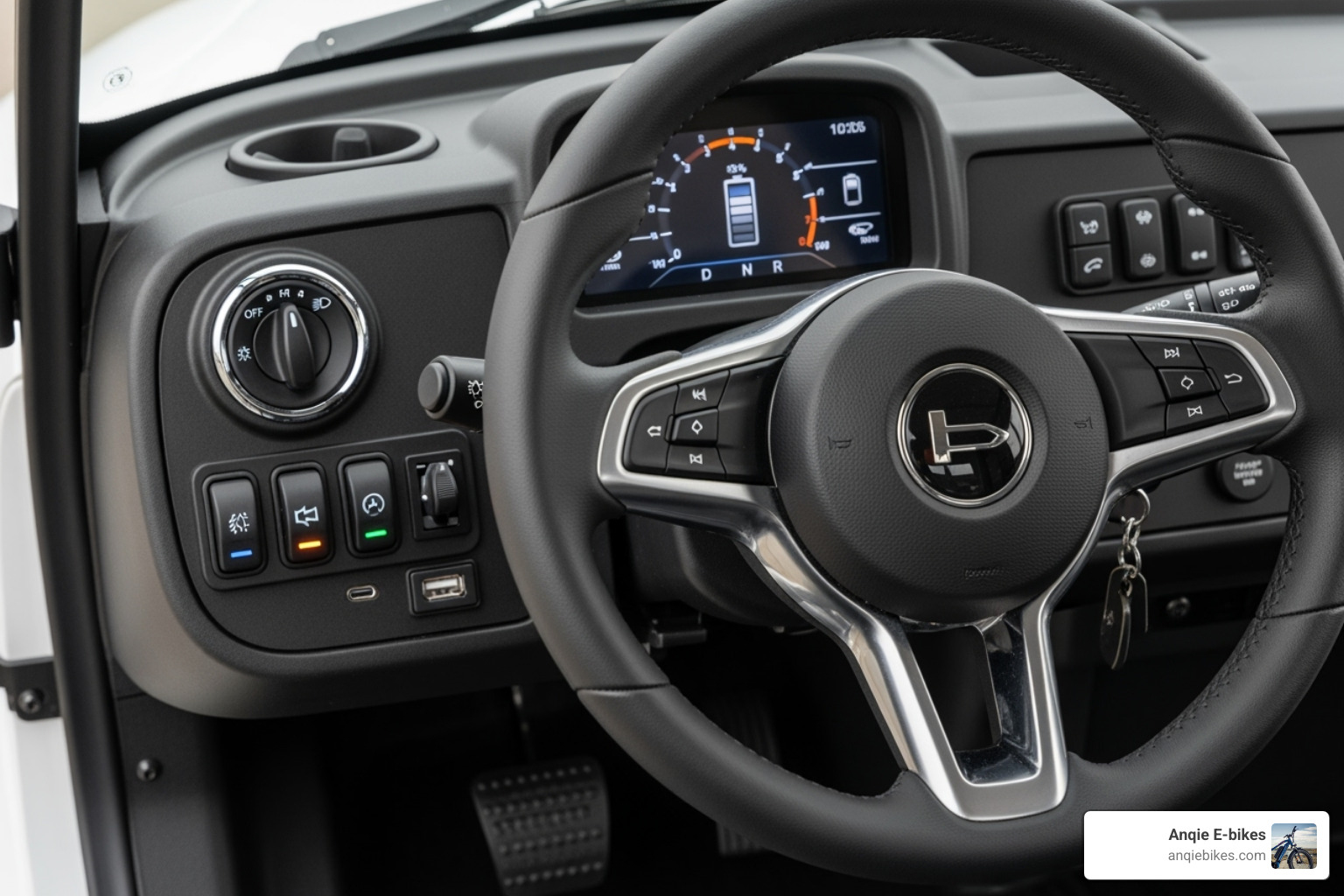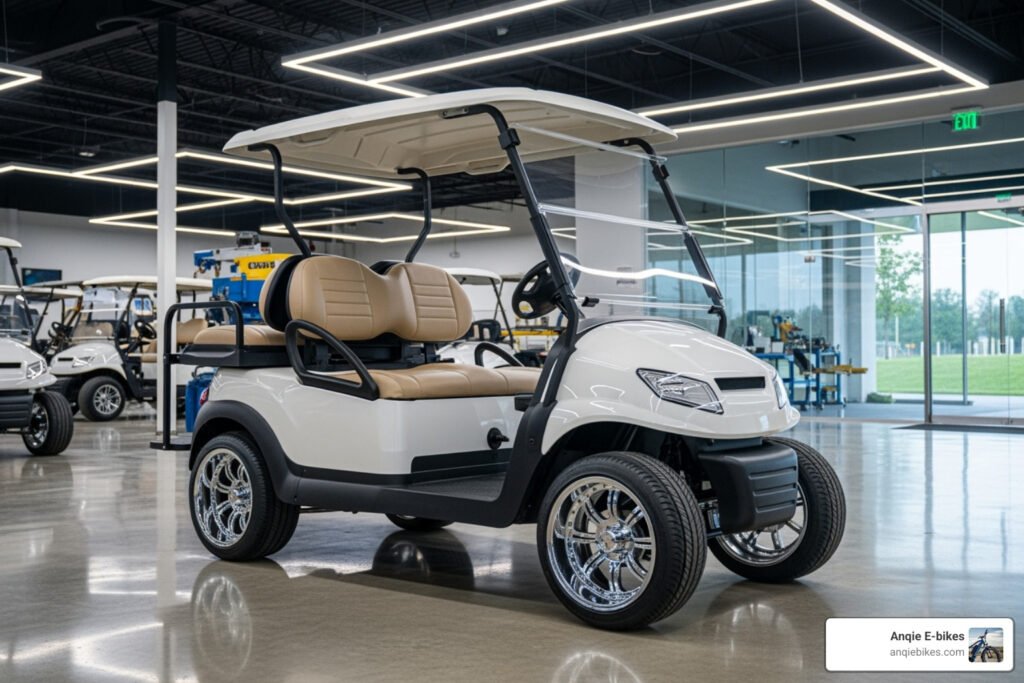Understanding the Mini Electric Golf Cart Manufacturing Landscape
When searching for a mini golf carts electric manufacturer, buyers typically need to evaluate several key factors:
Top Considerations When Finding a Manufacturer:
- Production Capacity – Look for factories with proven output (10+ containers/day indicates scale)
- Quality Certifications – ISO 9001, CE marking, DOT compliance for street-legal models
- Component Quality – Reputable suppliers like Curtis controllers, Trojan batteries, or equivalent
- Customization Services – OEM/ODM capabilities for custom specifications
- After-Sales Support – Warranty coverage (3-5+ years) and service network availability
- Manufacturing Origin – Major hubs include China (Guangzhou, Dongguan) and USA (Augusta, GA)
The global electric golf cart market reached $1.5 billion in 2022 and is projected to hit $3.1 billion by 2030, growing at a 9.5% CAGR. The mini electric segment is experiencing particularly strong growth as more buyers find these compact vehicles work beautifully beyond golf courses—in gated communities, RV parks, resorts, and even for light utility work around properties.
Finding the right manufacturer matters because this isn’t just about buying a vehicle. You’re investing in a long-term relationship with a supplier who will support your product through its entire lifecycle. The difference between a quality manufacturer and a mediocre one shows up in battery life, build durability, parts availability, and whether someone answers the phone when you need help.
I’m Mark Stark, and my experience in the electric vehicle industry has given me deep insight into evaluating mini golf carts electric manufacturer quality and reliability. I’ve helped countless customers steer the complexities of sourcing these vehicles, ensuring they find suppliers who deliver both product excellence and comprehensive support.

Why Go Electric and Mini? The Core Advantages
If you’re wondering whether a mini electric golf cart is right for you, let me share why so many people are making the switch. These compact vehicles aren’t just a passing trend—they’re genuinely changing how we think about short-distance transportation.

The environmental benefits alone make a compelling case. Electric mini golf carts produce zero emissions—no exhaust fumes, no contribution to air pollution, just clean, quiet operation. Picture yourself gliding silently through your neighborhood or across a golf course without that telltale gas smell or engine rumble. Your neighbors will appreciate the peace, and you’ll feel good knowing you’re reducing your carbon footprint with every trip.
But going electric isn’t just about being green. It’s also about being smart with your money. Electricity costs far less than gasoline per mile, and that adds up quickly. Even better, electric motors require dramatically less maintenance than gas engines. No more oil changes, no spark plugs to replace, no carburetor adjustments. The simplicity of an electric motor means fewer things can go wrong, which translates to more time enjoying your cart and less time (and money) spent on repairs.
Now let’s talk about why “mini” matters. These compact carts are built for maneuverability—they can steer tight spaces that larger vehicles simply can’t handle. Whether you’re weaving through a crowded campground, navigating narrow resort pathways, or making sharp turns on a golf course, their smaller footprint gives you confidence and control.
The portability factor is a game-changer for many buyers. Several mini models feature collapsible designs that fold down for easy transport and storage. Imagine fitting your golf cart in an RV storage compartment, truck bed, or even the back of an SUV. This convenience opens up possibilities that traditional carts simply can’t match. Weekend trips become easier, storage becomes less of a headache, and suddenly you can take your cart places you never thought possible.
Electric vs. Gas-Powered Carts
Let’s get into the real numbers and differences between electric and gas-powered carts, because this comparison often determines which direction buyers ultimately go.
When you calculate the total cost of ownership, electric mini golf carts typically win. Yes, the upfront price might be similar, but that’s just the beginning of the story. Fuel costs for gas carts fluctuate with oil prices and can be unpredictable, while charging an electric cart costs pennies per charge. We’re talking about potentially saving hundreds of dollars per year in operating costs alone.
The maintenance difference is even more striking. Gas engines are complicated machines with dozens of moving parts that need regular attention. You’re looking at routine oil changes, air filter replacements, spark plug maintenance, and periodic carburetor cleaning. With an electric cart, the motor itself is nearly maintenance-free. Your main focus shifts to battery care, which—especially with modern lithium-ion technology—is surprisingly simple. This means fewer trips to the repair shop and more money staying in your pocket.
From a performance standpoint, electric carts offer something gas engines can’t match: instant torque. The moment you press the accelerator, you get immediate power. This creates smooth acceleration without the jerky starts that sometimes plague gas carts. Climbing hills feels effortless, and the responsive power delivery makes the driving experience more enjoyable overall.
And we can’t forget the environmental impact. Every time you choose to drive an electric cart instead of a gas-powered one, you’re making a choice for cleaner air and a healthier planet. It’s a small decision that adds up to real change when multiplied across thousands of users.
Versatility Beyond the Golf Course
Here’s where things get really interesting. Despite having “golf cart” in the name, these vehicles have broken free from the fairway and found homes in countless other settings.
In gated communities, mini electric carts have become the preferred way to get around. They’re perfect for visiting neighbors, picking up mail, or making quick trips to community amenities. The quiet operation means you’re not disturbing anyone, and the compact size makes parking a breeze.
Resorts and campgrounds have acceptd these carts enthusiastically. Guests love the convenience of exploring grounds without walking long distances, and the peaceful, emission-free operation preserves the natural ambiance. Picture yourself at a campsite, unloading gear from your mini cart without the noise and fumes of a gas engine disrupting everyone’s outdoor experience.
For owners of large properties, these carts serve double duty as both transportation and light utility vehicles. Need to haul tools from one end of your property to another? Check. Want to move supplies around your estate? Done. Some models can be fitted with utility boxes, changing them into practical workhorses for tasks like hauling equipment, moving materials, or transporting supplies.
One of the most exciting developments is the growing category of street-legal mini electric carts, often classified as Low-Speed Vehicles (LSVs). These can legally operate on certain public roads, dramatically expanding where you can take them. Before heading out on public streets, though, make sure you understand the specific requirements. You can learn more about the regulations at this helpful resource: Information on low-speed vehicle regulations. Always verify your local laws to ensure you’re in compliance.
When you’re ready to explore these versatile vehicles, choosing the right mini golf carts electric manufacturer becomes crucial. The quality of the manufacturer determines everything from battery life to how well your cart performs years down the road. At Anqie E-bikes, we understand that finding a reliable manufacturer with solid after-sales support makes all the difference in your ownership experience.
Decoding the Specs: A Buyer’s Guide to Mini Electric Golf Carts
When you’re evaluating options from a mini golf carts electric manufacturer, the technical specifications matter more than you might think. It’s easy to get caught up in aesthetics—and yes, a good-looking cart is nice—but what really counts is how it performs day after day, how long it lasts, and whether it keeps you safe. Let’s walk through what you should be looking for.

The specifications tell the real story of a cart’s capabilities. You want to understand the performance metrics that determine how it handles hills and distance, the build quality that ensures it won’t fall apart after a season, the safety features that protect you and your passengers, and the customization options that let you tailor it to your specific needs. These aren’t just numbers on a spec sheet—they’re indicators of whether this cart will serve you well for years to come.
Battery and Power Systems
Everything in an electric mini golf cart starts with the battery and power system. This is the engine room, if you will, and understanding your options here is absolutely essential.
The first big choice you’ll face is battery chemistry: Lead-Acid versus Lithium-Ion. Each has its place, and which one makes sense depends on your budget and how you plan to use the cart.
| Feature | Lead-Acid Batteries | Lithium-Ion Batteries |
|---|---|---|
| Cost | Lower initial cost | Higher initial cost |
| Lifespan | Shorter (3-5 years typically) | Longer (8-10 years or more) |
| Weight | Heavier, impacts cart weight and efficiency | Lighter, improves performance and range |
| Maintenance | Requires regular watering and terminal cleaning | Virtually maintenance-free |
| Performance | Voltage sag under load, consistent discharge | Consistent power output, no voltage sag until empty |
| Charging | Slower charging, best with full charge cycles | Faster charging possible, can be ‘opportunity charged’ |
Lead-acid batteries have been around forever and they’re reliable. They’re also easier on your wallet upfront. But here’s the thing: they require regular maintenance—you’ll need to check water levels and keep terminals clean. They’re also heavier, which affects how efficiently your cart runs.
Lithium-ion batteries cost more initially, but we’ve found they’re often worth the investment. They last two to three times longer, they weigh significantly less (which means better performance and range), and they require virtually zero maintenance. You can also charge them whenever it’s convenient without worrying about battery memory issues. Many quality manufacturers now offer lithium options as standard or upgrades.
Beyond chemistry, pay attention to battery capacity (measured in Amp-hours or Ah) and voltage (typically 48V or 72V). Think of capacity like the size of your gas tank—more Ah means you can go farther. Higher voltage systems generally deliver more power and better efficiency, especially when climbing hills or carrying heavier loads.
Most electric mini golf carts will give you a range of 25 to 40 miles per charge, though this depends heavily on how you use them. Driving on flat terrain with a light load? You’ll get more miles. Tackling steep hills with four passengers and cargo? Expect less. Charging time typically runs 6 to 10 hours from completely empty, though lithium batteries often charge faster and don’t mind being topped off throughout the day.
Many carts come with convenient on-board chargers, so you just plug directly into a standard outlet—no need for separate charging equipment.
The motor type matters too. You’ll encounter AC (Alternating Current) or DC (Direct Current) motors. AC motors are generally more efficient, deliver better torque, and need less maintenance over time. Motor power, measured in kilowatts (kW), tells you how much oomph your cart has. A 3.7kW motor handles basic tasks well, while a 5kW motor gives you extra power for hills and heavier loads.
Construction, Comfort, and Safety
A reputable mini golf carts electric manufacturer knows that power alone doesn’t make a great cart. The frame needs to be solid, the ride needs to be comfortable, and safety features need to be comprehensive.
Let’s start with the bones of the cart—the chassis material. You’ll typically see steel or aluminum. Steel is strong and traditional, but aluminum offers some real advantages: it’s naturally corrosion-resistant (great if you’re near saltwater or in humid climates), and it’s lighter without sacrificing strength. That lighter weight translates to better efficiency and performance. Body materials are usually durable plastics or fiberglass, engineered to handle sun, rain, and the occasional bump without cracking or fading.
The suspension system determines how smooth your ride feels. A basic leaf spring setup works fine on flat, maintained surfaces. But if you’re dealing with rough terrain, bumpy paths, or unpaved roads, look for something more sophisticated—independent suspension systems that absorb shocks and keep all wheels planted. The difference in comfort is night and day, especially on longer trips.
Seating capacity is straightforward: 2-seater models are compact and nimble, 4-seaters work great for families, and 6-seater configurations suit larger groups or commercial operations. But capacity is just the beginning. Look at the actual seat quality—premium seats with proper cushioning and ergonomic design make every ride more enjoyable. Features like contrast stitching might seem cosmetic, but they often indicate attention to detail throughout the build.
Don’t overlook the little things that make daily use more pleasant: cup holders for your morning coffee, storage compartments for bags or tools, and thoughtfully designed dashboards with easy-to-read displays. Some modern carts even include USB charging ports—a small touch that makes a big difference when you’re using your phone for navigation or music.
Safety deserves your closest attention. A quality cart needs a robust braking system, whether hydraulic or mechanical, that stops reliably every time. Hydraulic brakes generally offer better stopping power and require less effort, while mechanical brakes are simpler and easier to service.
Essential safety features include bright headlights and taillights for visibility, seat belts for all passengers, and a sturdy windshield to protect from wind, rain, and debris. If you’re planning to use your cart on public roads as a street-legal vehicle, it must meet specific requirements—turn signals, mirrors, and other equipment mandated by low-speed vehicle regulations.
The best manufacturers don’t cut corners on safety. They understand that you’re trusting them with the well-being of your family, friends, or customers. When you’re comparing options, pay attention to which safety features come standard and which are optional upgrades. That tells you a lot about the manufacturer’s priorities and values.
How to Choose the Right Mini Golf Carts Electric Manufacturer
Finding a trustworthy mini golf carts electric manufacturer can feel overwhelming at first, but it doesn’t have to be. With the electric golf cart market booming—especially from major manufacturing hubs in China and the USA—you have more options than ever. The key is knowing where to look and what questions to ask.

Many buyers start by sourcing directly from factories through B2B platforms like Made-in-China, which can offer competitive pricing and access to a wide variety of models. Trade shows are another fantastic avenue—there’s something invaluable about meeting manufacturers face-to-face, examining their products up close, and having real conversations about your specific needs. Whether you’re attending the Canton Fair or a regional electric vehicle expo, these events give you a chance to compare multiple suppliers in one place.
The real challenge isn’t finding manufacturers; it’s finding the right one. We’ve seen too many buyers get burned by rushing into partnerships without proper vetting. Quality assurance should be your North Star throughout this entire process.
Vetting a Potential Mini Golf Carts Electric Manufacturer
Before you commit to any mini golf carts electric manufacturer, you need to do your homework. Think of this as interviewing a potential business partner—because that’s exactly what you’re doing. A thorough vetting process protects your investment and ensures you’re working with a supplier who can deliver on their promises.
Start by understanding their Minimum Order Quantity (MOQ). Some manufacturers require bulk orders, while others are flexible with smaller quantities. This matters whether you’re buying for personal use or planning to resell. Knowing the MOQ upfront saves everyone time.
Next, dig into the component specifications. A reputable manufacturer will be completely transparent about what goes into their carts. We’re talking about motors from trusted brands like American KDS or German Mahle, controllers from American Curtis, and chargers from Canadian Delta-Q. If a manufacturer is vague about their components or unwilling to share detailed specs, that’s a red flag.
Ask about their Quality Control procedures in detail. The best manufacturers have rigorous systems in place—from Incoming Quality Control (IQC) that inspects raw materials, to Production Quality Control (PQC) that monitors every manufacturing stage, to final Quality Assurance (QA) testing. Some manufacturers even test 100% of their products on the assembly line before shipping, ensuring every single cart meets their standards.
Understanding a company’s history and experience gives you context about their reliability. How long have they been in business? A manufacturer established in 2000 has weathered market changes and built institutional knowledge that a newer company simply hasn’t had time to develop. That said, newer manufacturers can bring fresh innovation—just make sure they have the expertise to back it up.
Production capacity tells you whether a manufacturer can scale with your needs. Look for concrete numbers: factory size, number of production lines, daily output capacity. A facility with a 200,000 square meter workshop and the ability to deliver 10 containers per day demonstrates serious manufacturing capability.
Don’t overlook R&D capabilities. Manufacturers with dedicated research and development teams are constantly improving their products and staying ahead of industry trends. This innovation mindset often translates into better carts for you.
If you need custom specifications or branding, ask about OEM/ODM services. Many manufacturers offer these options, allowing you to customize designs, colors, features, and even add your own branding. This flexibility can be crucial for businesses looking to differentiate their offerings.
Finally, inquire whether they produce components in-house or outsource everything. Manufacturers who control their own chassis, body panels, molds, and paint operations typically have better quality control and can keep costs more competitive.
Certifications and Quality Control
Certifications aren’t just paperwork to file away—they’re proof that a mini golf carts electric manufacturer takes quality, safety, and environmental responsibility seriously. We always look for these credentials when evaluating potential partners.
ISO 9001 certification is the gold standard for quality management systems. It demonstrates that a manufacturer has implemented rigorous processes to consistently deliver products that meet customer and regulatory requirements. When you see ISO 9001 on a manufacturer’s credentials, you know they’re committed to systematic quality control. For a deeper understanding of what this certification means, check out this resource: Find out more about quality certifications.
For carts sold internationally, CE marking is essential. This certification indicates compliance with European health, safety, and environmental protection standards. Even if you’re not in Europe, CE marking signals that a manufacturer meets strict international benchmarks.
If you’re considering street-legal carts, DOT compliance isn’t optional—it’s mandatory. These carts must meet specific safety requirements to legally operate on public roads, and you don’t want to find compliance issues after you’ve made your purchase. For more information on these requirements, visit: Information on low-speed vehicle regulations.
Beyond certifications, investigate the manufacturer’s quality control process. The most reliable manufacturers implement checks at every stage. They inspect incoming materials before they enter production. They monitor quality during manufacturing. They conduct final inspections and testing before any cart leaves the facility. This multi-layered approach catches potential issues early, before they become your problem.
Pay attention to component sourcing as well. Manufacturers who partner with reputable component brands—established names with proven track records—are making a statement about their commitment to quality. These components might cost more upfront, but they deliver better performance and reliability over the long haul.
The Importance of After-Sales Support from a Mini Golf Carts Electric Manufacturer
Here’s something we’ve learned from years in this industry: the relationship with your mini golf carts electric manufacturer doesn’t end when the cart arrives. In fact, that’s when it truly begins. After-sales support separates great manufacturers from mediocre ones.
A comprehensive warranty is your first line of defense. Look for bumper-to-bumper coverage that protects most components of your cart. Battery warranties deserve special attention since batteries represent a significant portion of the cart’s value. Some manufacturers offer impressive coverage—we’ve seen 5-year bumper-to-bumper warranties and even lifetime customer care programs. These aren’t just nice perks; they’re commitments that the manufacturer stands behind their product.
Spare parts availability might not seem critical when your cart is brand new, but give it a year or two. Can you easily order replacement parts for common wear items? Are specialty components available without a three-month wait? Manufacturers with dedicated parts and accessories programs make ongoing maintenance straightforward and stress-free.
Technical support quality varies dramatically across manufacturers. When something goes wrong—and eventually, something always does—you need knowledgeable, responsive support. Some companies offer 24/7 assistance, which can be a lifesaver when you’re troubleshooting an issue. Others have extensive service center networks providing local support and maintenance.
At Anqie E-bikes, we understand that exceptional customer service and strong after-sales support are just as important as selling quality products. We provide expert guidance throughout your buying journey and remain available to help long after your purchase. That’s the kind of relationship you should expect from any manufacturer you work with—a true partnership focused on keeping your cart running smoothly for years to come.
Frequently Asked Questions about Mini Electric Golf Carts
We talk to customers every day who are curious about electric mini golf carts, and honestly, the same great questions keep coming up. Let’s tackle the most common ones so you can feel confident about your decision.
What is the average range of a mini electric golf cart?
Most mini golf carts electric manufacturer models will give you somewhere between 25 to 40 miles on a full charge. That’s usually enough for a full day of cruising around your community, exploring the campground, or enjoying several rounds of golf.
Now, here’s the thing—your actual range depends on quite a few factors. Think of it like fuel economy in a car. If you’ve got a larger battery capacity (measured in Amp-hours), you’ll naturally go farther. The terrain matters too. Constantly climbing hills or navigating rough, bumpy ground will drain your battery faster than smooth, flat surfaces.
The load you’re carrying plays a big role as well. A cart packed with four adults and a cooler full of drinks will use more energy than just you cruising solo. Your driving habits matter too—smooth, steady acceleration is your friend, while jackrabbit starts and frequent stops will eat through your charge more quickly. Even temperature can affect things; extreme cold can temporarily reduce how far you’ll go on a charge.
So while that 25-40 mile range is a solid baseline, your real-world experience might vary. The good news is that for most daily uses—whether it’s running errands in your neighborhood or shuttling around a resort—you’ll have more than enough range to get where you need to go.
How long does it take to fully charge a mini electric golf cart?
Plan on about 6-10 hours to fully charge your electric mini golf cart from empty. For most people, this means plugging it in when you’re done for the day and waking up to a fully charged cart ready for action.
The actual charging time depends on a few things. Obviously, a completely dead battery takes longer to charge than one that’s just partially used. The charger type matters too—higher amperage chargers can juice up your batteries faster, though most carts come with convenient on-board chargers that work perfectly fine overnight.
Battery technology makes a difference here as well. Lithium-ion batteries often charge faster than traditional lead-acid batteries. They also have a neat advantage: you can do what’s called “opportunity charging,” which means topping them up for shorter periods throughout the day without hurting their lifespan. Lead-acid batteries, on the other hand, generally prefer full charge cycles.
We always tell customers to make charging part of their routine. Plug in when you’re done using the cart, and you’ll never have to worry about running out of juice mid-trip.
How often do the batteries need to be replaced?
This is where battery type really matters, and it’s worth understanding because batteries are the most significant maintenance expense you’ll face.
Lead-acid batteries typically last around 3-5 years. Their lifespan can be shorter if you frequently drain them completely, charge them inconsistently, or neglect maintenance tasks like checking water levels. They’re the more budget-friendly option upfront, but you’ll replace them more often.
Lithium-ion batteries are the marathon runners of the battery world, often lasting 8-10 years or longer. They’re more expensive initially, but when you factor in their longer lifespan and virtually zero maintenance requirements, they often come out ahead in the long run. Plus, they’re not as finicky about partial charges—you can top them up anytime without worry.
Beyond just the battery chemistry, how you use and care for your batteries makes a huge difference. Charging your cart regularly after use, avoiding complete discharges when possible, and following the manufacturer’s care guidelines will help you get the maximum life out of your investment. When you’re working with a quality mini golf carts electric manufacturer, they’ll provide clear guidance on battery care specific to your model.
At Anqie E-bikes, we’re always happy to answer questions about battery maintenance and help you understand what to expect from your specific cart. Our goal is to make sure your investment keeps rolling smoothly for years to come.
Conclusion
We’ve covered a lot of ground together, haven’t we? From understanding why electric mini golf carts are taking off globally—with the market racing toward $3.1 billion by 2030—to diving deep into battery specs, safety features, and what separates a good mini golf carts electric manufacturer from a great one.
The truth is, choosing the right manufacturer isn’t just about finding the lowest price or the flashiest model. It’s about partnering with a company that stands behind their products with solid certifications, transparent quality control processes, and genuine after-sales support. When something goes wrong (and let’s be honest, with any vehicle, something eventually will), you want a manufacturer who picks up the phone, has spare parts ready, and treats you like a valued customer, not just another order number.
We’ve seen how the best manufacturers distinguish themselves through their attention to detail—using reputable components like Curtis controllers and Delta-Q chargers, maintaining ISO 9001 certification, and offering comprehensive warranties that actually mean something. They understand that a mini electric golf cart is more than just a product; it’s your daily companion for getting around your property, your community, or your favorite resort.
The versatility of these compact vehicles continues to surprise us. They’re fantastic on the golf course, but they’re equally at home in gated communities, campgrounds, large estates, and even as street-legal neighborhood vehicles. Their quiet operation, zero emissions, and minimal maintenance make them a smart choice for anyone looking to reduce their carbon footprint without sacrificing convenience or fun.
At Anqie E-bikes, we’ve built our reputation on helping customers find exactly what they need. We know that buying an electric vehicle can feel overwhelming with all the technical specifications and options out there. That’s why we focus on providing clear, honest guidance and backing it up with exceptional customer service and comprehensive after-sales support. We’re here for the long haul, not just the initial sale.
If you’re ready to experience the freedom and convenience of a mini electric golf cart, we’d love to help you get started. Check out our featured model: Explore our Kandi Collapsible Mini Electric Golf Cart. It’s designed with portability and practicality in mind, perfect for those who value both performance and convenience.
The future of personal mobility is electric, it’s compact, and it’s already here. We’re excited to be part of your journey toward greener, quieter, and more enjoyable transportation.
